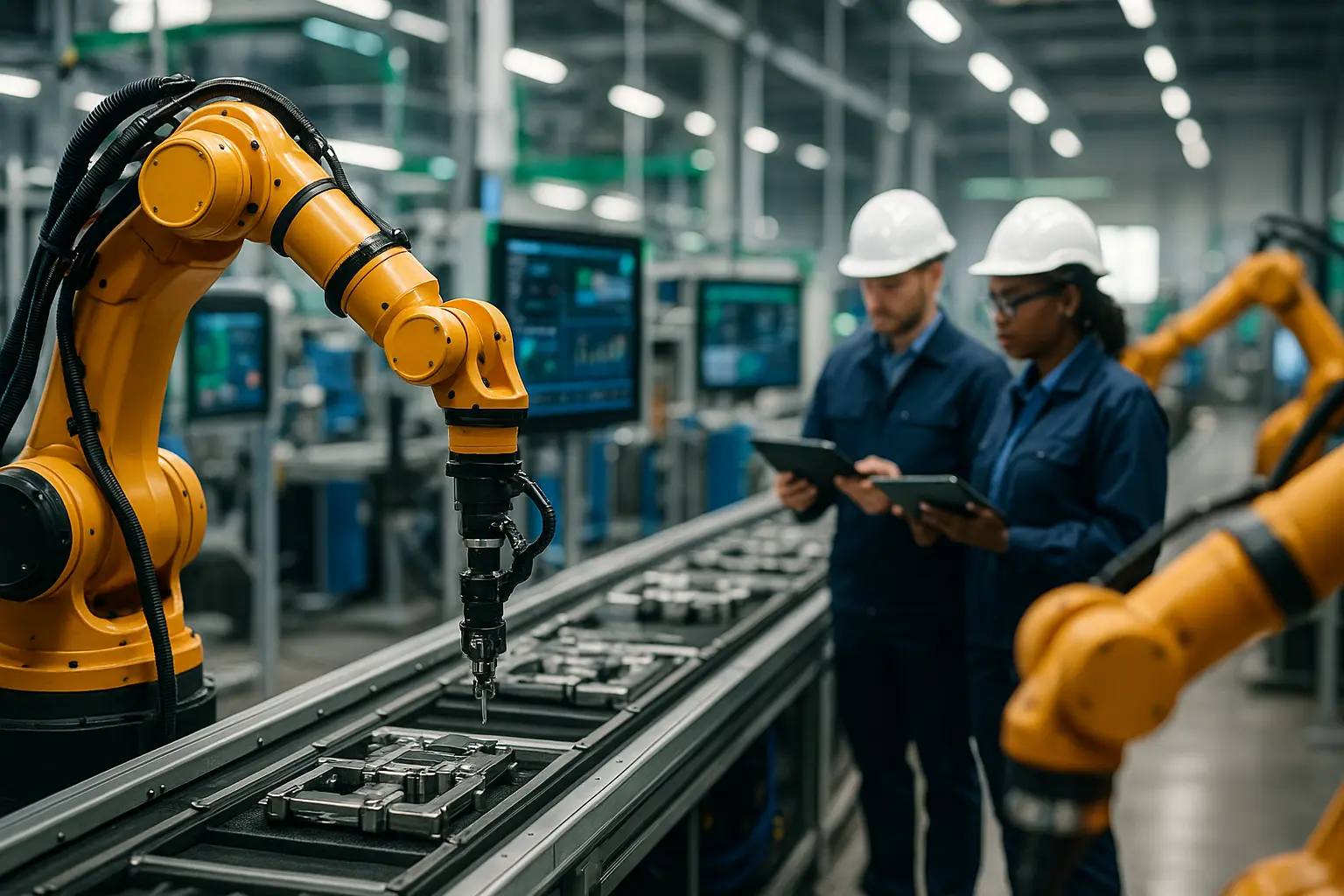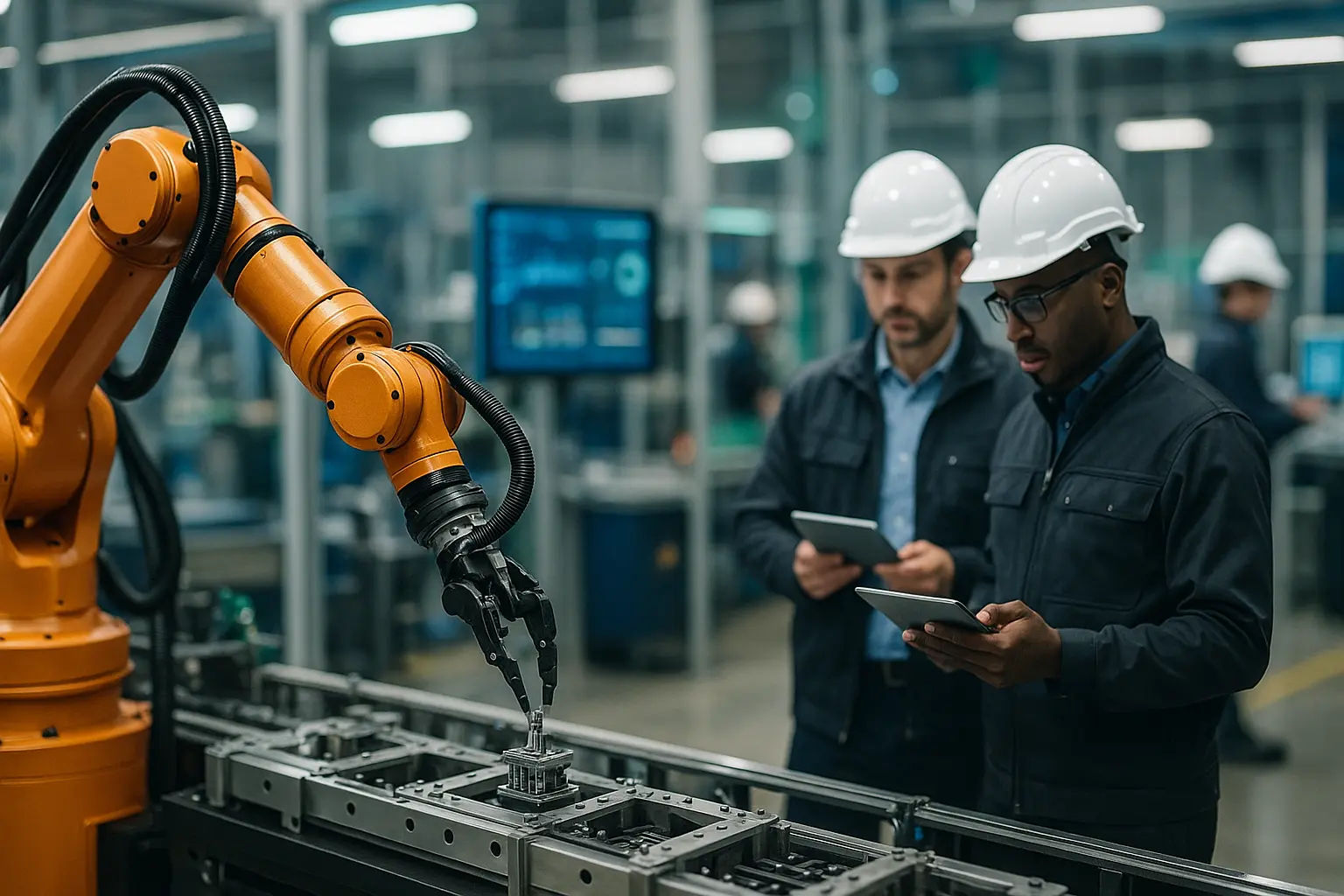Welcome to the dawn of Industry 4.0, a transformative era that is reshaping the very essence of manufacturing and production. As technology takes the helm, traditional factories are evolving into smart, interconnected ecosystems. This transformation isn’t just a fleeting trend; it’s a revolutionary shift towards sustainability and efficiency, driven by advanced technologies like the Internet of Things (IoT), Artificial Intelligence (AI), and robotics.
In this article, we explore the intricacies of Industry 4.0, unraveling how these futuristic factories operate, the benefits they bring, and how they are paving the way for a more connected industrial world. Whether you’re a business leader, tech enthusiast, or curious reader, you’ll find yourself captivated by the vibrant world of smart manufacturing.
Understanding the Core of Industry 4.0
At the heart of Industry 4.0 lies a seamless integration of cutting-edge technologies that redefine traditional manufacturing. This new era isn’t just about automation; it’s about creating a dynamic, interconnected network where machines communicate, data flows freely, and processes become more efficient.
Smart Factories: The cornerstone of Industry 4.0, smart factories are equipped with IoT devices, sensors, and embedded systems that enable real-time monitoring and control. These factories leverage data analytics to optimize production lines and minimize downtime, creating a more sustainable and cost-effective environment.
The Internet of Things (IoT): IoT plays a pivotal role in Industry 4.0 by linking various devices and systems. This connectivity allows for an unprecedented level of monitoring and management, ensuring that every aspect of production is streamlined and synchronized.
Artificial Intelligence (AI): AI technologies enhance decision-making processes by analyzing vast amounts of data swiftly and accurately. From predictive maintenance to quality control, AI is a powerful tool that empowers manufacturers to make informed choices and improve efficiency.
Human-Machine Collaboration: Industry 4.0 emphasizes collaboration between humans and machines. Workers are no longer simply operators; they become strategic partners who use technology to enhance productivity and innovation. This shift not only improves workplace satisfaction but also fosters creativity and problem-solving.
By understanding these core components, you gain a clearer picture of how Industry 4.0 is shaping the future of manufacturing—one that’s smarter, more connected, and perfectly aligned with the demands of the modern world.
The Benefits of Embracing Smart Factories
Embracing the principles of Industry 4.0 offers a multitude of advantages that extend far beyond traditional manufacturing methods. As businesses transition to smart factories, they unlock new levels of efficiency, innovation, and competitiveness.
Enhanced Efficiency: Smart factories are designed to operate with maximum efficiency. By utilizing real-time data and advanced analytics, these facilities can quickly adapt to changes in demand, optimize resources, and reduce waste. This adaptability ensures that production lines are always running at peak performance, resulting in cost savings and higher profitability.
Improved Product Quality: With the ability to monitor every stage of production, smart factories ensure that quality control is second to none. Automated systems can detect defects early, preventing costly recalls and maintaining high standards. This meticulous attention to quality builds trust and satisfaction among consumers.
Agility and Flexibility: In today’s fast-paced market, agility is crucial. Smart factories possess the flexibility to rapidly adjust to new trends and demands. This nimbleness allows manufacturers to bring new products to market quicker and respond adeptly to changing consumer needs.
Sustainability and Environmental Responsibility: As environmental concerns grow, businesses are striving to minimize their carbon footprint. Smart factories contribute to this goal by optimizing energy usage, reducing waste, and promoting sustainable practices. By adopting these eco-friendly approaches, companies not only demonstrate social responsibility but also appeal to environmentally conscious consumers.
Competitive Advantage: Companies that embrace Industry 4.0 gain a significant competitive edge. By harnessing the power of data, automation, and AI, they can innovate faster, deliver superior products, and stay ahead in the global arena.
The journey towards smart factories is a strategic move that promises a wealth of benefits, setting the stage for a more prosperous and sustainable future.

Challenges and Considerations in Transitioning
As enticing as the allure of smart factories may be, the transition to Industry 4.0 isn’t without its challenges. While the potential benefits are immense, companies must navigate several hurdles to successfully implement technological advancements.
Investment Costs: One of the primary obstacles is the significant initial investment required to modernize facilities and integrate new technologies. For many businesses, the cost of upgrading equipment and infrastructure can be daunting. A strategic approach to investment, focusing on areas with the highest potential ROI, can help mitigate these costs.
Data Security and Privacy: With increased connectivity comes amplified risk. Protecting sensitive data from cyber threats is a pressing concern in a highly digitized manufacturing environment. Companies must prioritize robust cybersecurity measures to safeguard their operations and maintain the trust of their stakeholders.
Skill Gap: The transition to smart factories demands a workforce proficient in digital skills. However, there exists a notable skill gap in the labor market. Companies need to invest in employee training and development to ensure their teams are well-prepared for the challenges of Industry 4.0.
Integration and Compatibility: Many businesses face difficulties in integrating new technologies with existing systems. Ensuring seamless compatibility between old and new machinery requires thorough planning and execution. This integration is crucial for achieving the full potential of smart manufacturing.
Cultural Change: Finally, the shift towards Industry 4.0 necessitates a cultural transformation within organizations. Management and employees alike must embrace a mindset of continuous improvement and collaboration, fostering an environment that welcomes innovation and change.
Understanding these challenges and proactively addressing them can significantly ease the transition to smart factories, allowing businesses to capitalize on the myriad benefits of Industry 4.0 while minimizing potential risks.
The Future of Industry 4.0: A Harmonious Symbiosis
As we look towards the future, Industry 4.0 promises a world where technology and human ingenuity coexist in harmony. It’s a future where factories are not just centers of production but ecosystems that foster innovation, sustainability, and resilience.
Increased Automation: Automation will continue to evolve, with robots and AI systems taking on more complex tasks. This not only enhances productivity but also allows humans to focus on creative and strategic roles that drive business forward.
Decentralized Production: The concept of localized and decentralized production will gain traction. By moving manufacturing closer to end-users, companies can reduce transportation costs and carbon emissions while responding more swiftly to local demands.
Hyperconnectivity: The future of Industry 4.0 is defined by hyperconnectivity, where everything is interconnected, from machines to supply chains. This seamless flow of information will create a more transparent and efficient manufacturing process that fosters collaboration across the globe.
Personalized Manufacturing: As consumer preferences become increasingly specific, personalized manufacturing will take center stage. Smart factories will have the capability to produce customized products at scale, offering a unique advantage in a competitive market.
Sustainability at the Core: With growing environmental awareness, sustainability will remain a central focus. Smart factories will continue to implement eco-friendly practices, reducing waste and conserving resources to protect our planet for future generations.
Industry 4.0 is not just a technological revolution; it’s a catalyst for a brighter, more inclusive industrial landscape. As we embrace this future, the possibilities are endless, and the journey towards smart, connected factories is only just beginning.
The shift towards Industry 4.0 is not merely an evolution; it’s a profound revolution that calls for collective participation. Together, we are paving the way for a future where manufacturing is not just efficient but also sustainable and innovative.
As we navigate this transformative era, it’s essential to embrace change and collaboration. By doing so, we unlock the true potential of smart factories, ensuring they become more than just places of production. They will stand as testaments to human ingenuity, resilience, and the power of technology to enhance our world.
Let us embark on this journey with optimism and dedication, creating a future where technology works hand in hand with creativity and compassion. As we move towards a new dawn, the possibilities for Industry 4.0 are limitless, opening doors to a world of opportunities and advancements that will shape the industries of tomorrow.
FAQ
What is Industry 4.0 and how does it differ from previous industrial revolutions?
Industry 4.0 refers to the fourth industrial revolution characterized by the integration of digital technologies into manufacturing. Unlike previous revolutions that focused on mechanization, electrification, and automation, Industry 4.0 emphasizes smart technologies, data exchange, and the Internet of Things (IoT) to create interconnected and efficient factories.
How does the Internet of Things (IoT) contribute to smart manufacturing?
IoT plays a pivotal role in smart manufacturing by enabling machines and devices to communicate with each other. This connectivity leads to real-time data collection and analysis, allowing manufacturers to optimize operations, predict maintenance needs, and improve overall production efficiency.
What are the benefits of implementing smart factories in the manufacturing sector?
Smart factories offer numerous advantages, including enhanced productivity, improved quality control, reduced downtime, and greater flexibility in production processes. They also enable manufacturers to respond quickly to market demands, reduce operational costs, and achieve sustainable practices through efficient resource management.
What challenges do companies face when transitioning to Industry 4.0 technologies?
Transitioning to Industry 4.0 technologies involves several challenges, such as significant upfront investment, cybersecurity risks, and the need for a skilled workforce. Additionally, companies must address interoperability issues, data management complexities, and ensure seamless integration with existing systems.
How can businesses ensure the successful implementation of Industry 4.0 initiatives?
For a successful Industry 4.0 implementation, businesses should start with a clear strategy and roadmap. Engaging in employee training, investing in cybersecurity measures, collaborating with technology partners, and continuously monitoring and adapting processes are critical steps to ensure smooth adoption and long-term success.


